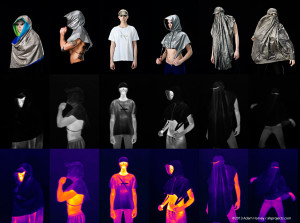The short answer for your privacy: Yes!
The medium answer: If you care about your comprehensive privacy at all times, then yes you should wear a camouflage burqa all the time. If you don’t, then you might as well go out naked in public.
I hope you’re now curious enough to read the longer answer below.

Have you ever heard that if you use a paper shredder, you should use it on your mundane paperwork as well as all your sensitive documents? In addition, you should probably mix your shreddings with all your neighbors’ shreddings before placing any of it outside. I endorse these statements as a security professional, because these actions help protect your sensitive data by using a few related factors:
- Random mundane papers create “noise” that make the sensitive papers harder to reconstruct from a shred pile. When reconstruction is successful, privacy attackers have a chance of gaining sensitive data equal to the sensitive paper total divided by the total of all shredded papers. Shredding only sensitive documents makes their chances 100%!
- The more neighbors share a shred bin, the harder it is to determine any one sensitive paper’s origins.
- Mixing neighbors’ shredded documents with your own creates higher odds of similar forms filled with different data sharing the same shred pile. These mixed-source template documents are harder to reconstruct correctly into each original filled-data source.
- The few shreds in the pile which contain a whole sensitive data item, like a social security number, become harder to find as they are mixed in with more random data shreds. Like the proverbial needle in a haystack, instead of a needle in a needlestack.
For all the reasons above, if you really care about anyone’s privacy, you should always wear a camouflage burqa outside (yes burqas for men too!). You never know when you will need to hide your facial identity from stalkers or drones. Even if you don’t have a stalker (yet), wearing the same camouflage burqa as someone who has a stalker helps them blend into your crowd, to hide from their stalker. They will probably return the favor someday, even if they don’t know it. If you don’t care about being stalked or helping anyone else maintain their privacy, then you might as well go out naked, because infrared cameras can see through your normal clothes anyways.
I hope that my fabulous and self-selecting readers all understand by now that this “camouflage burqas” talk was a bit tongue-in-cheek. I would never endorse blaming the victims like this. If you don’t understand this and want to write some hate mail, please go comprehend these links instead. Stalkers and identity thieves should all go to jail, not force the rest of us to wear camouflage or ghillie suits and shred paperwork all the time!
I actually don’t care at all about your personal fashion sense. In my opinion, what you wear doesn’t matter at all as long as you’re comfortable (this is why I could never understand the appeal of corsets or high heels — they look as appealing as self-torture). What I really care about is your privacy online, in the digital realm.
Encryption is a camouflage burqa for your communications online. Really good pervasive encryption standards in routers are like ghillie suits for your data — rendering it indistinguishable from background network state updates. Plain-text (the default state of Internet communications like HTTP web sites) communications standards force your data to go out into the world naked, for everyone to see. There aren’t really any “fashionable” options in between these two extremes online. That’s why you should always use encrypted communications like HTTPS (that ‘S‘ stands for “Secure“), regardless of your online content’s sensitivity.
Even if you don’t care about your own privacy, using secure encryption all the time helps maintain the privacy of others around you. Your home’s National Spy Agency might not like it, but your neighbors should all love you for it. The Data Roads networks will give you the default of encryption, with the option of exercising your freedom to let your data “go out naked” whenever you choose to give up your own privacy.